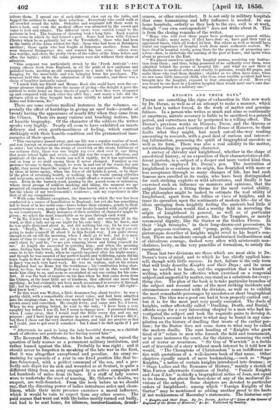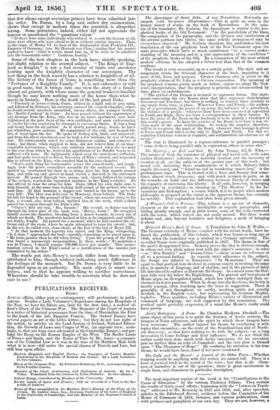KNIGHTS AND THEIR DAYS.'
THERE are something like signs of exhaustion in this new work by Dr. Doran, as well as of an attempt to make a manner, which at its best is rather forced, do the work of matter and genuine fulness. In a person who writes so much and aims so continually at smartness, minute accuracy is liable to be sacrificed to a pointed period, and correctness may be postponed to a telling effect. The Doctor's previous works on Dinners, Dress, and the Queens or rather the Courts and Courtiers of the House of Hanover, be their faults what they might, had much out-of-the-way .reading amounting to research, with a good deal of curious and interest- ing information, possessing the spirit of biographical anecdote as well as its form. There was also a real solidity in the matter, notwithstanding its gossiping character. A survey of chivalry and knighthood, whether in the shape of aneedotical history, or an exposition of their characteristics at dif- ferent periods, is a subject of a deeper and more varied kind than has hitherto employed Dr. Doran's pen. The institution of knighthood is so curious in its origin, has flourished with more or less acceptance through so many changes of life, has had such famous men enrolled in its ranks, who have been distinguished for such striking exploits or wild adventures, and finally, it has exercised such an influence on manners and opinions that the subject furnishes a fitting theme for the most varied ability. The philosopher might be tasked to estimate the real utility of knighthood, apart from the follies or vices of knights, and to trace its operation upon the sentiments of modern life—for of the ideas springing from knightly feeling the ancients had little if any. The historian would find a worthy field in narrating the origin of knighthood in general, as well as of particular orders, having substantial liower, like the Templars or merely ceremonial dignity, like the Garter or the Golden Fleece. In their "high triumphs," in their long-drawn-out processions, in their gorgeous costumes' and "pomp, pride, circumstance," the picturesque describer of knights might revel to his heart's con- tent. There are incidents enough of hsirbrained foolhardiness and. of chivalrous courage, dashed very often with aristocratic non- cha]ance, levity, or the very punctilio of formalism, to satisfy the raconteur.
These last two divisions are those which are most akin to Dr. Doran's turn of mind, and to which he has chiefly applied him- self, though with little success. In fact, failure is the only term that will truly describe Knights and their Days ; and its cause may be ascribed to haste, and the supposition that a knack of writing, which may be effective when exercised on a congenial subject and supported by matter, can stand as a substitute for every- thing else. The plan of the book is to take particular branches of the subject and recount some of the most striking incidents and circumstances connected with the division as well as to exhibit the most remarkable personages by anecdotes or short biographical notices. The idea was a good one had it been properly carried out ; but it is for the most part very poorly executed. The duels of knights, rather affectedly called. " Duelling, Death, and Burial," affords scope for a very interesting chapter to a man who had vestigated the subject and. took the requisite pains to develop it. Dr. Doran's account is inferior to what may be found in any com- pilation on the history of duelling that treats of the earlier por- tion ; for the Doctor does not come down to what may be called the modern duello. The cant heading of "Knights who grew tired of it" refers to men who forsook the field and tournament, or in some instances the court, for the cloister, assuming the cowl out of terror or weariness. "Sir Guy of Warwick" is a feeble sort of travestie of a story without much interest be it told how it would. "The Champions of Christendom" is an indifferent no- tice with quotations of a well-known book of that name. Other (+niters.. equally smack of mere bookmaking,—such as "Stage Knights," a notice of certain knights introduced into dramas ; or "Stage Ladies and the Romance of History," mainly a sketch of Miss Farren afterwards Countess of Derby. "Female Knights and Jean d'Arc " is chiefly a biographical notice of Jean, not equal to its theme, but about the best-done of any of the mediieval di- visions of the subject. Some chapters are devoted to particular orders of knighthood ; among which "Foreign Knights of the Garter" may be mentioned as adding another proof to the haste if not recklessness of Macaulay's statements. The historian says • Knights and their Days. By Dr. Doran, Author of " Lima of the Queens of .Englani of the ROOM Of Hanover," cfe. fe. Published by Bentley.
that few aliens except sovereign princes have been admitted into the order. Dr. Doran, by a long and rather dry enumeration, shows that except in modern times the assertion is altogether wrong. Some potentates, indeed, either did not appreciate the honour or questioned the "quantum valeat."
"If there were some individuals who refused to accept the honour at all, there were others who were afraid to do so without curious inquiry. . Thus, in the reign of Henry VI. we hear of the Ambassador from Frederick Emperor of Germany, (one Sir Hertook von Clux,) stating that his master wished to know what it would stand him in, if he were to be admitted into the honourable order' ! Cautious Austria."
Some of the best chapters in the book have strictly speaking, but slight relation to the avowed subject. "The Kings of Eng- land as Knights" is not a bad resume of traits and anecdotes bearing upon the knightly character of our sovereigns. The best thing in the book scarcely has a relation to knighthood at all. The history of the house of Guise is something more than the "Fortunes of a Knightly Family." It is not exhaustive or told in good taste, but it brings into one view the story of a family almost sui generis with whose name the general reader is familiar though he may know nothing more of the house than what he meets in history. Here is the death of the last great Duke. "Precisely at seven o'clock, Guise, attired in a light suit of grey satin, and followed by Pericart, his secretary, entered the council-chamber; where he found several members assembled, among others, his younger brother, the Bottle-Cardinal' de Guise. An hour passed without the appearance of any message from the King, who was in an inner apartment, now half- frightened at the pale faces of his own confidants, and anon endeavouring to excite his own resolution by attempts to encourage theirs. It was a long and weary hour for all parties. As it slowly passed away, Guise, he knew not wherefore, grew anxious. He complained of the cold, and heaped bil- lets of wood upon the fire. He spoke of feeling sick, faint, and unnerved; and from his diver sweetmeat-ease he took a few bonbons, by way of break- fast. He subsequently asked for some Damascus raisins, and conserve of roses; but these, when supplied to him, did not relieve him of an unac- countable nervousness' which was suddenly increased when the eye next to the sear from which he derived his appellation of Le Balafre began to be suffused with tears. He indignantly wiped away the unwelcome suffusion, and had quite recovered as Rivol, Secretary of State, entered, and requested him to attend on the King, who awaited him in his own chamber. "Guise gaily flung his bonbonniere across the council-table, and laugh- ingly bade the grave councillors scramble for the scattered sweets. He started up, overturned his chair in so doing, drew his thin mantle around him, and with cap and gloves in hand waved a farewell to the statesmen present. He passed through two rooms, and, closely followed by various of the archers' reached the tapestried entrance to the King's cabinet. No one offered to raise the arras for him. Guise lifted his own right arm to help himself, at the same time looking half-round at the archers who were near him. At that moment a dagger was buried in his breast, up to the very hilt. The blow was delivered by Montsery, from behind. The Duke let fall his hand to the pommel of his sword ; when one assessin clung to his legs, a second, also from behind, stabbed him in the neck, while a third passed his weapon through the Duke's ribs. "Guise's first cry was, 'Ho friends !' His second, as Serino ran him through the lower part of the back, was, Mercy, Jesus !' Be struggled faintly across the chamber, bleeding from a dozen wounds, in every one of which sat death. The murderers hacked at him as he staggered, and wildly, yet feebly, fought. All paused for a moment, when he had reached the ex- treme end of the room, where he again attempted to raise his sword , but, in the act, he rolled over, stone-dead, at the foot of the bed of Henri BM "At that moment the tapestry was raised, and the King, whispering, Is it done ?' approached the body ; moodily remarking as he gazed upon it, 'He looks greater than he did when living: Upon the person of the Duke was found a manuscript memorandum in these words—' To maintain a war in France, I should require 700,000 livres per month.' This memo- randum served in the King's mind as a justification of the murder just committed by his orders."
The words put into Henry's mouth differ from those usually attributed to him, though without indicating much difference in the feelings of the monarch. But Dr. Doran is very little to be depended upon as an authority. His main object is smart sen- tences, and to that he appears willing to sacrifice correctness. Wherefore should he take trouble to ascertain what he does not care to use ?



























 Previous page
Previous page